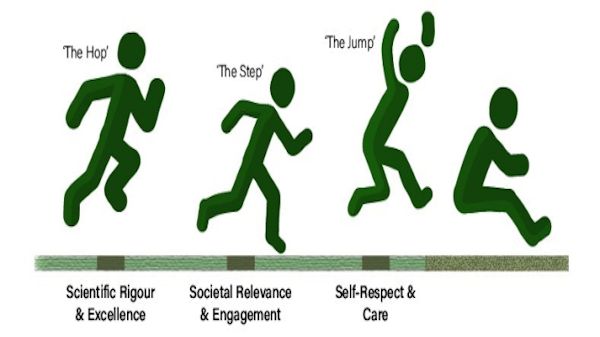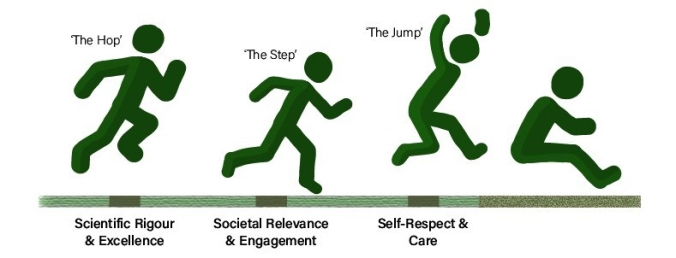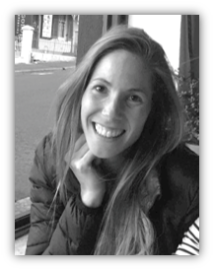
Transdisciplinary PhD Journeys: Reflecting on the challenge of the ‘transdisciplinary triple jump’
This is the first post in a series on ‘Transdisciplinary PhD Journeys’ which will run for the next six months.
Have you ever watched a triple-jump athlete? It is incredible to see how the athlete executes this three-part movement. It requires excellent technical competencies, rhythm, and the ability to manage each of the three movements in concert. “Every aspect of the jump must be perfect: the run up, the hop, step and the jump”. And each of the movements requires focused attention to specific skills, training and preparation.

The transdisciplinary triple jump: A three-part movement in which PhD scholars must learn about paying attention to scientific rigour and excellence, societal relevance and engagement, and self-respect and care (Graphic by Caydn Barker).
In our reflections on the challenges of applying principles of transdisciplinary (TD) research in our PhDs, we have come to realise that there are three critical aspects which we have had to pay attention to simultaneously. These are: scientific rigour and excellence, societal relevance and engagement, and self-respect and care. Like the athlete training for the triple jump, the TD PhD student must learn to afford equal attention to these three aspects, and manage them concurrently. The metaphor is not perfect though. We live and work in complex systems, which are characterised by uncertainty, non-linearity, values, emotions, spirituality, power, and context-dependence. We therefore humble ourselves, knowing that what is an appropriate balance between these three aspects will change over time and depend on us as individuals and the context in which we work. In learning how to conduct TD research, we will not execute these three aspects with perfection, and we don’t do them in a straight line as in the triple jump. However, in the context of a PhD, which is a carefully defined slice of complex reality and unfolds as a linear-time process, we find the ‘transdisciplinary triple jump’ a useful metaphor to guide reflection and build reflexivity.
We are a small group of scholars at various stages of our PhD journeys. We briefly got to know each other through summer schools, conferences, and workshops in a field of research which we broadly define as ‘sustainability science’. Each of us works at a different institution across the global north and south, we have different research topics, and approach our TD PhD research from different perspectives. We recognise that people may ‘come at’ TD from different vantage points. The value in the unfolding conversation between us lies in celebrating those different viewpoints whilst finding common ground. We share an interest in connecting with others working in this way, and the need to reflect and learn together.
We’ve decided to do this through a blog series which will hopefully also encourage and inspire others, promote critical discussion, and through which we can get to know each other better. We have been surprised by how little discussion there is in the literature about the particular challenges of operationalizing TD in PhD research, and have been inspired by fellow early career researchers who have begun sharing their experiences of conducting research in novel ways to address the complex challenges of TD sustainability science. We therefore wanted to create a focused means of sharing the lessons we’ve learnt in each of our individual TD PhD journeys with the broader community of scholars in sustainability science and related fields.
We are drawn to transdisciplinarity as a means of conducting ‘science with society’1. We understand transdisciplinary research as a reflexive research approach which seeks to address societal problems through, and beyond, interdisciplinary collaboration. This is done through simultaneous collaboration between researchers and societal actors to transcend the boundary between science and society, to enable mutual learning processes and knowledge co-production2,3. We recognise that the label of ‘transdisciplinarity’ is just one of many labels for this kind of research, and appreciate that approaches such as participatory action research and community-based participatory research also seek to conduct science with society. Much can be learnt from and with academics working in these allied fields of research, and from exploring what makes TD research unique.
Responding to calls to ‘be transdisciplinary4’, we have committed to applying and critically reflecting on the principles of TD in our PhD research. However, in current institutional structures and cultures of academia, this adds an additional challenge to the existing demands of PhD research5,6. Not only are we expected to navigate the terrain of interdisciplinarity described as an ‘undisciplinary journey’6 which requires ‘epistemological agility’, but we are also confronted with the task of engaging meaningfully with societal actors beyond our academic comfort zones. All of this means we are constantly trying to ‘be everything to everyone’ and risk burning ourselves out in the process.
There is growing debate and concern in academic circles about the personal costs of an academic career, and as early-career researchers we are particularly aware of the pressure to successfully launch our careers. We would like to build a career in which we conduct academically excellent research which engages society meaningfully, but are not willing to sacrifice our own personal health and happiness in the process. We recognise that creating a work-life balance in academia is a challenge faced particularly by young researchers, by women, and by parents. We hope that our reflections provide a space to think creatively about how we can shift our academic institutions to become places in which we can thrive whilst serving society through our work.
This is the introductory blog post for the series, which we envisage will run over the next six months. During this time, each of us will share reflections on our individual TD PhD journeys, and describe how we are navigating/balancing/managing the demands of the ‘transdisciplinary triple jump’. We will also share our thoughts on some of the questions being posed at the forefront of transdisciplinary research practice, including for example:
- How do we manage the dual challenge of academic and practical relevance and rigour?
- How do we learn and generalize across multiple TD and place-based research cases?
- How can place-based TD research support efforts towards global sustainability?
- What skills and competencies should ‘specialist TD scholars’ develop, and what are the different roles for ‘specialist TD scholars’ in sustainability science research teams?
- How do we navigate issues of agency, responsibility and ethics in TD research?
- How do we think about TD research in the global south?
We look forward to sharing our experiences, insights and further questions with you to deliberate the exciting opportunities and challenges we face in conducting transdisciplinary research. Please join the conversation!
You can subscribe to updates on this blog hosted by the ‘Social-Ecological Systems Scholars’ network, or follow the blog series via the FutureEarth Blog. You can also connect with us individually below.
Authors of this post:

Jessica Cockburn
Postdoctoral Scholar in the Environmental Learning Research Centre, Rhodes University, South Africa.
Connect with Jessica on social media
Learn more about Jessica at this website

My Sellberg
PhD Scholar at Stockholm Resilience Centre, Stockholm University, Sweden.
Connect with My on social media
Learn more about My on this website

David P. M. Lam
PhD Scholar at the Institute for Ethics and Transdisciplinary Sustainability Research
Connect with David on social media
Learn more about David on this website

Megan Davies
PhD scholar at the Centre for Complex Systems in Transition, Stellenbosch University, South Africa.
Connect with Megan on social media
Learn more about Megan on this website

Petra Holden
PhD scholar at the Plant Conservation Unit and the African Climate and Development Initiative, University of Cape Town.
Learn more about Petra on this website
Key references to the literature:
1Seidl, R., Brand, F. S., Stauffacher, M., Krütli, P., Le, Q. B., Spörri, A., . . . Scholz, R. W. (2013). Science with Society in the Anthropocene. AMBIO, 42(1), 5-12. Online here.
2Lang, D. J., Wiek, A., Bergmann, M., Stauffacher, M., Martens, P., Moll, P., . . . Thomas, C. J. (2012). Transdisciplinary research in sustainability science: practice, principles, and challenges. Sustainability Science, 7(1), 25-43. Online here.
3Jahn, T., Bergmann, M., & Keil, F. (2012). Transdisciplinarity: Between mainstreaming and marginalization. Ecological Economics, 79, 1-10. Online here.
4van Kerkhoff, L. (2014). Developing integrative research for sustainability science through a complexity principles-based approach. Sustainability Science, 9(2), 143-155. Online here.
5Roux, D. J., Nel, J. L., Cundill, G., O’Farrell, P., & Fabricius, C. (2017). Transdisciplinary research for systemic change: who to learn with, what to learn about and how to learn. Sustainability Science, 12(5), 711-726. Online here.
6Haider, L. J., Hentati-Sundberg, J., Giusti, M., Goodness, J., Hamann, M., Masterson, V. A., … & Sinare, H. (2018). The undisciplinary journey: early-career perspectives in sustainability science. Sustainability Science, 13(1), 191-204. Online here.
